Sitting at a table in a bar in downtown Guangzhou, we journalists sipped our drinks, eagerly awaiting the arrival of a group of British students from the University of Central Lancashire (UCLan) in Preston (普雷斯顿). The group of 20 students were on a 16 day trip to mainland China and Hong Kong, and spent nearly two weeks in Guangzhou. As this trip was facilitated by the strong links between GDUFS and UCLan, we were eager to gather their expectations, experiences and insights into their time here.
We began by sitting down with Zed Ali and Emily Howarth – both studying for degrees in Economics – and Francesca Walker: a Senior Lecturer in the School of Management, who led the trip. They introduced us to LaunchPad, which is a two year development programme that UCLan students can join in their second year. LaunchPad is an extracurricular programme, which gives the students the opportunity to observe, interact and network with the business world, while still studying at university. This programme involves a trip abroad to a country of their choice, and they chose Guangzhou because of the connections available through the GDUFS-UCLAN partnership.
Expectations
We were eager to learn more, and so asked our interviewees about their expectations of GDUFS, Guangzhou and even China as a whole. They admitted that they didn’t have too many expectations of the programme, as they wanted to approach the trip with an open-mind – although they knew that, on the academic side, they would be meeting students and observing and experiencing a Chinese education, and on the business side, they would be observing the differences between Chinese business culture and UK business culture.

The interview: Francesca, Emily and a GDUFS News Journalist
Some of the group members made an effort to learn about Chinese culture before the trip, and were interested specifically in how links could be built and strengthened between China and other countries. To achieve this, the group spoke to students who took part in previous LaunchPad trips to China, and there was also close contact with the International College (IC) UCLan 2+2 students who are now studying in the UK, and gathered information about what they would need on the trip. In addition, they watched videos of the city and looked at many photos, but this still didn’t prepare them for the reality of Guangzhou – a bustling, modern metropolitan city.
Impressions of Guangzhou
Emily admitted that the infrastructure is far more developed than they had expected, and the size of the city is on a scale far more epic than they’d anticipated: three times the size of London! Even after two weeks, they still found it difficult to visualise a map of the city in their heads, and Francesca admitted that, when asked by a group member how long it would take from GDUFS to Taojin, she answered simply “I don’t know”. However, they enjoyed exploring the city through public transport, and eventually felt confident enough to use buses and the metro without help from staff or IC students. Emily joked that their first metro journey ‘alone’ was successful, as they didn’t get lost or get off at the wrong station!
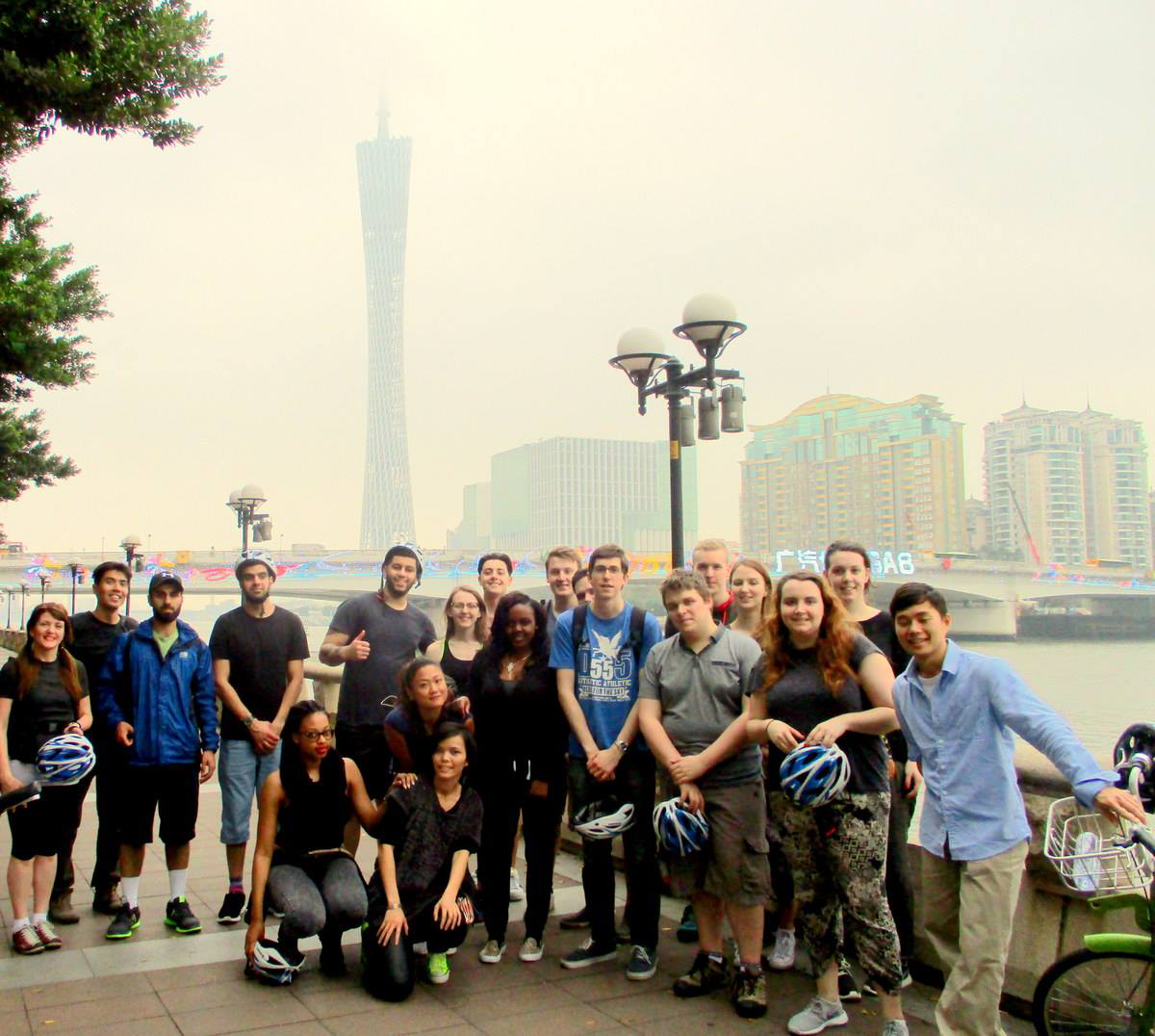
The end of the group’s cycling tour
They were also able to explore Guangzhou freely from above ground, as they spent one day taking part in a 16 km cycling tour from Taojin to Zhujiang New Town – finishing at Canton Tower. Although they had a “wobbly start” and one (thankfully minor) casualty along the way, they all eventually made it in one piece, and had a lot of fun.
Activities
Their two weeks were hectic yet productive, as they had various activities planned throughout the day: morning, afternoon and evening. “We haven’t had a minute to ourselves”, they joked. The activities ranged from formal business engagements to informal cultural occasions; at one point, they went to a cinema to see Hitman: Agent 47 – in Chinese!
They visited a famous monastery in Foshan, and even though they were greeted by a typical Guangdong monsoon, they nevertheless had a fabulous day – sitting through a traditional Chinese opera performance. A group of them also had a fantastic experience watching Guangzhou Evergrande football team, and some also took part in the radio show My Guangdong on Radio Guangdong – interviewed by Matt Horn MBE, the cornerstone of the UCLan programme at GDUFS who also works for Radio Guangdong and GZTV.

The group at the Guangzhou Evergrande stadium
Our interviewees emphasised the friendliness of everyone they met, and that they’d be made to feel very welcome by everybody. At one point, when visiting a market, a small group entered an incense shop, and the owner became really excited as it transpired that they were the first foreigners ever to visit her shop! Emily and Francesca laughed and smiled as they told us how the owner wanted photos with the UCLan group, and when more of the group arrived, even more photos were taken. No doubt they are celebrities on her WeChat Moments!
Communicating with the locals
Our interviewees highlighted one of the significant differences between China and Europe: even in countries where English is not an official language, most shop assistants and people on the street have a basic enough knowledge of English to deal with most everyday queries. However, the language barrier became much more apparent here, and so the IC UCLan students were invaluable throughout the group’s trip – serving as tour guides and translators for a range of activities the group took part in. During a trip to the leather market, the IC students used their bartering and haggling skills to get the best deals for the group members on a range of products.
They also acknowledged the importance of technology in communication, such as translator apps and online dictionaries, and nevertheless appreciated the presence of the IC students whenever the language barrier became a problem.
Food
The group were able to explore the huge variety of Chinese cuisine at several points during their trip. They had a large celebration meal on the night they arrived, in which the group members met with a group of the IC UCLan students for the first time. They spent several hours at the famous Dongbei restaurant near the main gate of the north campus, eating, drinking and chatting, and this served as their first “ice-breaker” for what would be the start of an unforgettable two weeks.
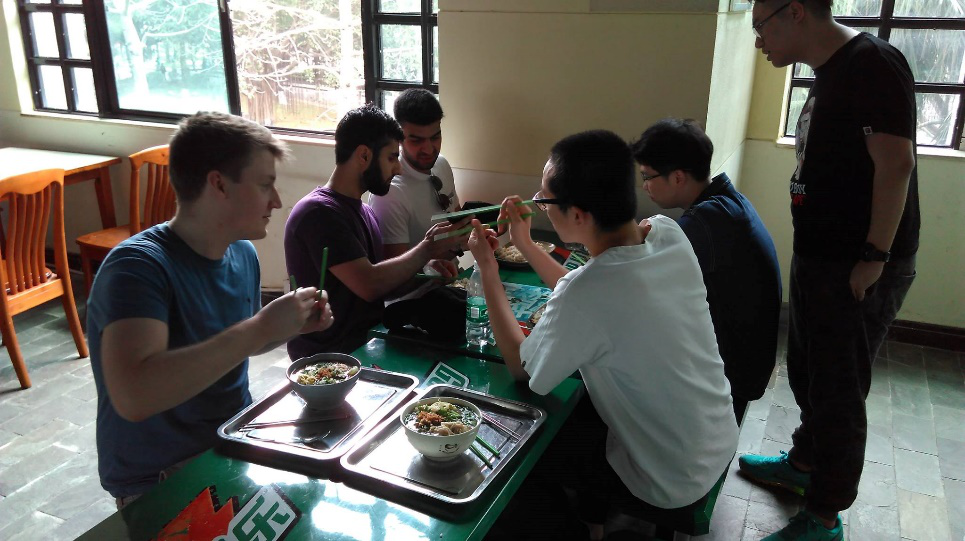
The first meal in the school canteen (and the first to use chopsticks!)
They also sampled dim sum at the Easeland Hotel near the GDUFS campus. This particular meal didn’t just explore a new style of food however, as it was also an introductory demonstration of formal dining etiquette, with a focus on the customs of the business culture in China. Francesca called it “eye-opening”, as this included: where people should sit; what they should say; when they should begin eating, and even how high they should hold their cup when proposing a toast! They acknowledged that, while this was interesting, it was far more interesting to discover what NOT to say and do while at the table!
However, they acknowledged the need for this only in a business context, as later, when they travelled to Nansha District to visit several factories, they had lunch in a rural country restaurant. Here, the etiquette they had learned wasn’t needed, as they were “treated as friends, not visitors”. At this point, our interviewees smiled, and we could tell from this just how much they had enjoyed this experience.
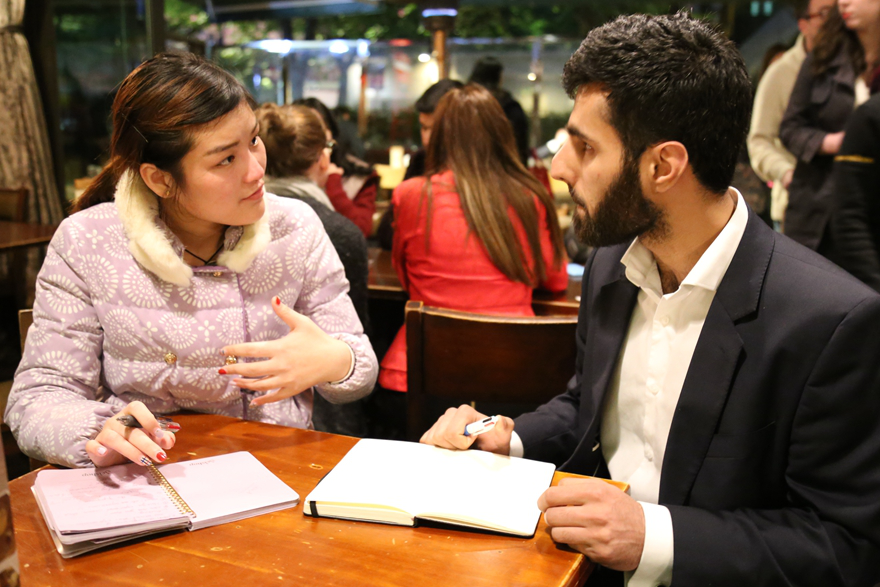
A GDUFS News journalist with one of the group
It was these moments that helped the group to relax when dining, for fear of committing an inadvertent culinary faux pas. In fact, our interviewees admitted that it took them a few days to get used to Chinese food, and a few of them were going hungry at first. “A few of us were just eating rice for the first few days”, Emily told us. Another challenge was becoming skilful with chopsticks, and this also took a while to master. It was during these times that they were thankful for the IC UCLan students, who were incredibly supportive and understanding, and never once criticised or commented on their burgeoning (if faltering at times) abilities. Indeed, once the group began to feel increasingly comfortable with the environment around them, and other people’s opinions, they began to explore the range of food China has to offer more freely. “Once we relaxed, we weren’t hungry anymore”, Emily joked.
Towards the end of the trip, the group acknowledged how their attitude towards Chinese food had changed significantly throughout their time here. On their third trip to McDonald’s a few days before they left, some group members admitted that they would’ve preferred a bowl of noodles to a burger and fries!
Impressions of GDUFS
The group really enjoyed experiencing the GDUFS campus, and acknowledged several major differences between it and UCLan’s campus. Whereas UCLan is a city-based university – with its teaching and administration buildings spread across different parts of Preston – GDUFS is a campus-based university, and so is much more self-contained. This means that, in Preston, there is much more interaction with the public, whereas GDUFS feels more secure, as the majority of people in the area are students.
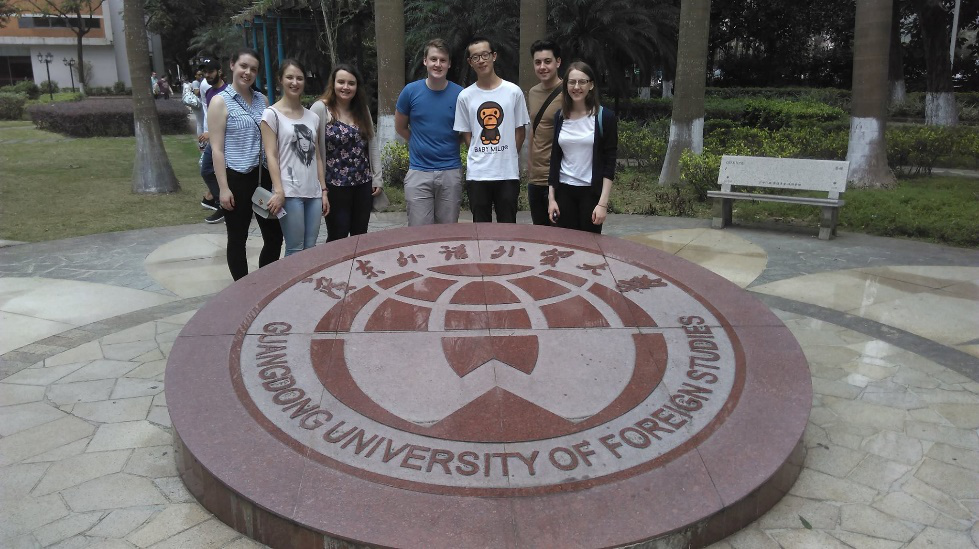
The group’s first day at GDUFS
The approach to basic amenities also differs. For example, GDUFS has a handful of dedicated canteens for students, which provide affordable meals to the majority of students. Although this approach exists in British schools, at university, students are encouraged to cook for themselves in shared kitchens provided with their accommodation, or simply to purchase food in the restaurants and cafes around Preston.
Our interviewees drew parallels to the USA: “The campus feels much more American”, Emily observed, feeling that GDUFS’s lush greenery and small, tree-lined boulevards were much more reminiscent of San Francisco than Preston! They told us that this similarity is apparent even down to the smaller class sizes, and even the bells that ring to signal the start and end of lessons. The parallels continued with the dormitories at GDUFS, in which between four and six students share a room. This is perhaps one of the most striking contrasts with UK university life, as at UCLan, everyone is entitled to their own bedroom. In fact, the most that is shared is a kitchen, as students can choose to have their own bathroom if they prefer. Our interviewees were thankful for the situation they have experienced in the UK, as they felt it would “end in disaster” if they had to share a room – even with their best friends!
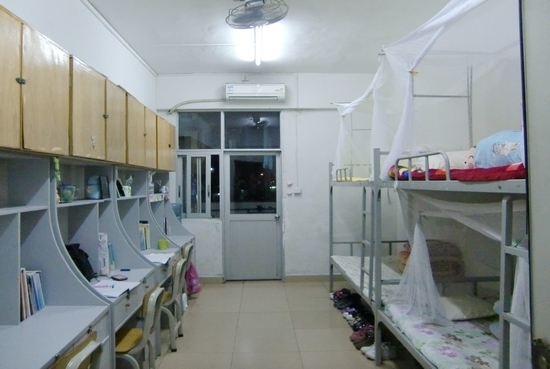
A typical GDUFS dormitory shared by four students
At this point, it was fascinating to hear the opposite perspective, as one of the interviewers felt she preferred the Chinese situation of living with friends, and would get “lonely” if she lived in a separate room. Perhaps this highlights the fact that we prefer simply whatever we are used to! It will be interesting to discover whether the IC students, once they are in Preston, prefer having their own room. However, at this moment, our interviewees praised the approach to shared dormitories in China, and highlighted the sad reality that, in the UK, many shy and socially-awkward students will become “hermits”, and almost completely shut themselves off from their other flatmates. We all agreed that perhaps there could be a healthy balance between the two systems.
Working with the IC UCLan students
The group worked closely with the IC UCLan students throughout the entire trip, and even joined a WeChat group with them before they arrived. In order to begin getting to know each other, both sides began interacting through text messages and short videos, which they told us was hugely beneficial for “breaking the ice”. They arrived on Sunday 6th March, and jumped into the start of the programme straight away – meeting some IC UCLan students that afternoon! They then had a tour of the campus, the library, the dorms and the classrooms, and began to gather their impressions of this remarkable location.
A few days later, they gave presentations to the IC students – which introduced UCLan, Preston and life in the UK. This aimed to provide the IC students with some knowledge of the culture they are going to be entering into in September. Following this, they then worked in small groups (4-5 students), and answered the students’ questions. The aim was to reassure the students about the daunting trip ahead of them, and provide a comprehensive introduction to life as a UK university student. This focused on the contrasting approaches to teaching and studying that the students will experience. “We hope to make it less of a shock to them when they arrive”, Francesca told us.
Francesca, who works closely with the IC students once they arrive in Preston, explained that UCLan emphasises the need for international students to mix with the UK students as much as possible – in order to maintain and improve their English, but also to gain as much from the opportunity as possible. Unfortunately, she admitted that they do observe a decline in English proficiency if these connections between the Chinese and British students are not forged, as even being in an English-speaking environment is insufficient to improve their language levels.

Emily and a GDUFS News journalist
We were fascinated by this point, and so wanted to further explore the difficulties surrounding the integration of international students into British university culture. When discussing how to improve this, Emily acknowledged that the UK students have an equal role to play in the integration of the Chinese students, and this is something that the group became increasingly aware of throughout their trip. While she praised UCLan’s International Office for the experiences they provide for international students, she felt that the student community also has a significant role to play in ensuring the international students make the most of their time abroad. She admitted that the lack of integration may be due to a lack of cultural awareness and a fear of causing embarrassment on both sides. Zed agreed, feeling that a lack of understanding causes the barriers to be set up. However, he praised his experiences during the two-week programme, stating that any barriers he had built before coming had been broken upon arrival – due to the incredible hospitality and generosity of the students and staff at GDUFS.
Strengthening the relationship between UCLan and GDUFS
UCLan is one of GDUFS’s oldest global partners, and thus the connection between the two institutions is strong in many ways. However, we were fascinated to gather our interviewees’ insights into this partnership, and to explore their perspectives on how it could be strengthened in the future.
From an academic point of view, Francesca told us that having colleagues teaching at GDUFS on behalf of UCLan is very important for ensuring a successful transition for the 2+2 students between GDUFS and UCLan, as they have first-hand knowledge of the differences (and thus the difficulties) associated with moving to a widely contrasting academic environment. As a result of this strong link, she believed that the GDUFS-UCLan 2+2 students are among the strongest international students upon arrival at Preston, and she praised Matt, Alison and Jake (the full-time UCLan staff based at GDUFS) for their diligence and commitment to the role.

Members of the group (with Jake on the left) enjoying some well-deserved drinks
From a student perspective, the group also suggested ways to strengthen the student relationship. Emily said that she now feels much more confident and comfortable approaching Chinese students in Preston, and is willing to help them in any way she can. “We want them to integrate with the community as much as possible”, she told us. In fact, she revealed that the group are already planning events and meet-ups for when the IC students arrive in the UK. Before taking part in the programme, the group members’ only impression of Chinese students was that they are shy and remain in their own friendship circles, but now, our interviewees have a much greater impression of why this is the case – having experienced the same situation from the opposite perspective. This growing understanding can have hugely positive implications for improving the integration between Chinese and British students – which is something that, after all, both groups are eager to facilitate.
Legacy
When asked what our interviewees felt might be the legacy of their trip to Guangzhou, they highlighted this need for increased and shared understanding and cooperation, and so the group will make a concerted effort to stay in touch with the IC students when they travel to Preston. Emily told us about a group of IC students from several years ago who arrived at their UCLan accommodation with no bedding, and a LaunchPad student met up with them and took them shopping to purchase everything they needed. “It’s the little things that make a massive difference”, Francesca smiled.
Following this trend of small beginnings, Emily told us that some of the male group members had been playing Fifa (a football-based video game) in the IC students’ dorms. The IC students had also helped the group order food and helped them travel around Guangzhou throughout the entire trip. We all agreed that it is these small acts of friendship that build bridges, and can lead to long-term friendships.
Francesca felt this increased understanding by the British students was one of the most significant legacies from the trip, telling us that if these gaps in cultural awareness can be bridged, it will help to facilitate the best possible experience for the international students who are only living abroad for a relatively short period in their lives. Emily agreed, and suggested that not only will this lead to the best possible experience in their studies, but it will have wider implications for their perspectives on travelling and on living abroad, which is something the students will keep with them for their whole lives.
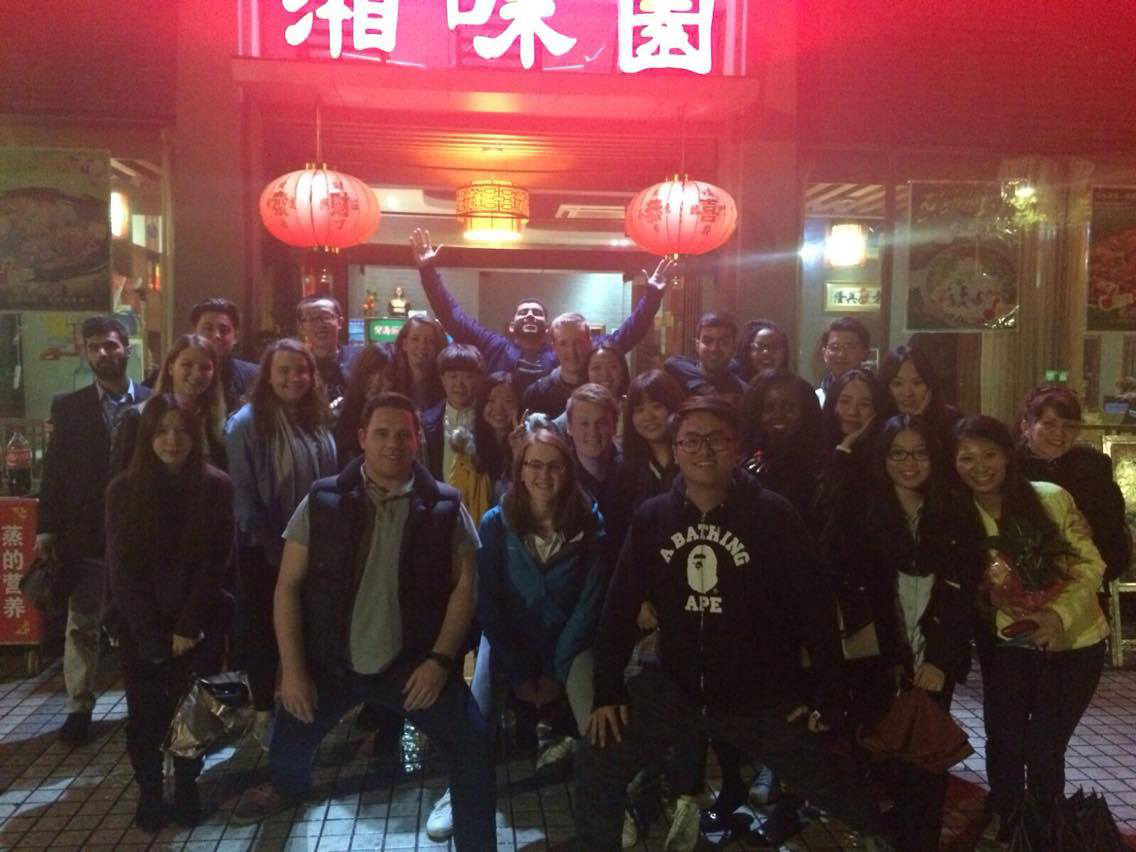
The group’s final night in Guangzhou
At this point, we concluded the interview, and after thanking them for taking part, left them to enjoy their final evening in mainland China – feeling elated by the positive future ahead for Chinese students studying abroad, and reassured that GDUFS students are in safe hands when studying in Preston.

